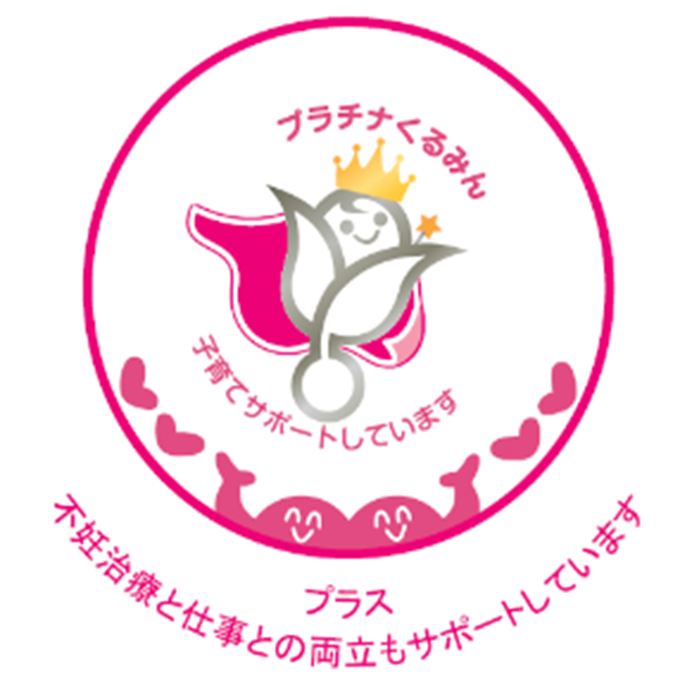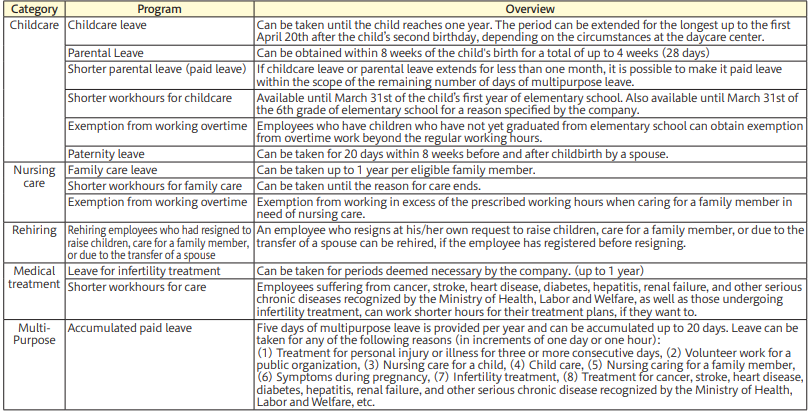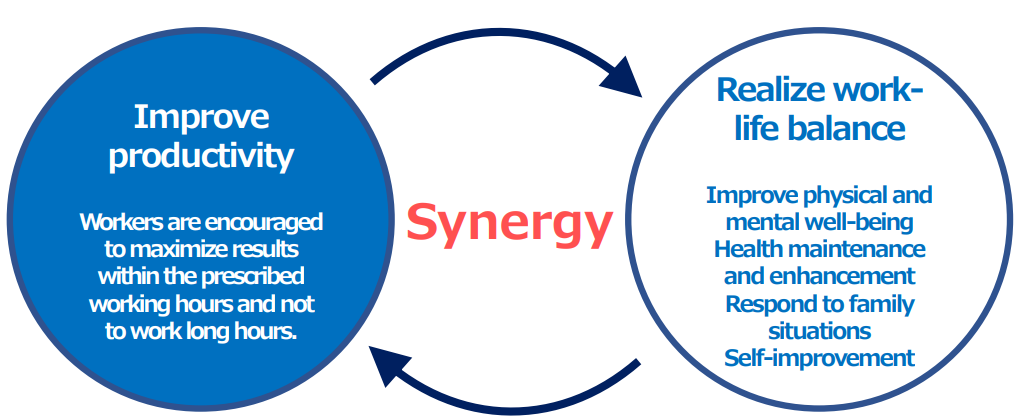
SHINKO ELECTRIC INDUSTRIES CO., LTD.

SHINKO ELECTRIC INDUSTRIES CO., LTD.
Among the Corporate Values stated in the Shinko Way, the Shinko Group has declared that it will “create a dynamic corporate culture that promotes a balance between employees’ personal and professional lives.” We strive to create workplaces that are pleasant for all employees.
Shinko has been continuously taking the initiative in the support for balancing work and personal life. In addition to ongoing initiatives to enable all employees to take annual leave simultaneously and to strengthen restrictions on overtime work, Shinko is making efforts to expand various systems aimed at balancing work with childcare, nursing care, and medical treatment (including infertility treatment), and promoting initiatives to realize diverse and flexible work styles.
In recognition of these efforts, on December 15, 2022, we became the first company in Nagano Prefecture to receive Platinum Kurumin Plus certification based on the Act on Advancement of Measures to Support Raising Next-Generation Children. This certification is given only to companies that meet certain requirements, in addition to having implemented high-level initiatives as a "child-rearing support company," and are working to improve the workplace environment to help employees balance work and infertility treatment.Thanks to various initiatives, the average length of service for women as of the end of March 2025 is 21.7 years, exceeding that of men (17.4 years). This is higher than the national average1 for the same industry (15.7 years).
1 From "'Average Value' in the criteria for the certification system based on the Act on the Promotion of Women's Active Engagement in Professional Life" (June 14, 2024), Ministry of Health, Labour and Welfare.

Shinko is working to foster a culture where employees feel comfortable taking childcare leave regardless of gender. To increase male participation in childcare, we are raising awareness through rank-specific training. We are also proceeding with initiatives such as introducing examples of system utilization through internal newsletters and childcare leave guidelines, while encouraging both employees and their supervisors to take childcare leave, as a result of which male childcare leave uptake rose to 55% in FY2024.

Specific results are published on the Ministry of Health, Labor and Welfare’s Support for Work-Life Balance webpage (Japanese only).
Going forward, we will continue to improve systems and foster a corporate culture that enables employees in a variety of circumstances to be active, no matter their life stage.
Shinko is focusing on Transforming Work Styles in pursuit of corporate development and growth as well as healthy, fulfilling lives for each and every employee.
In 2017, the Labor Management Council on Transforming Work Styles was established with representatives of Shinko, including the general managers of each manufacturing division, and labor union representatives as members, and a Joint Labor Management Declaration on Transforming Work Styles was made by top labor and management. The entire company is united in its efforts to implement and realize "work styles that do not presuppose long working hours" and "diverse and flexible work styles" based on the following policies.
Policy of Labor Management Council on Transforming Work Styles
・ We will work at Transforming Work Styles by encouraging all employees to transform their mindset, rather than adhere to conventional practices, in pursuit of a balance between corporate development and growth and healthy, fulfilling lives for each and every employee.
・ In carrying out Transforming Work Styles, we will take the dual approach of "increasing productivity" and "achieving work-life balance" and aim to create a dynamic corporate culture and establish workplace environments that are accepting of diversity and pleasant for all.
・ We will make Transforming Work Styles one of the most important issues for management and carry out united initiatives for its realization.

《Our Major Initiatives》
1. Measure to reduce working hours
Lowering the upper limit on overtime work
Maximum weekly working hours and management
Setting and managing the maximum number of consecutive working days
Requiring employees to leave the office on time every Wednesday and on the second and fourth Fridays every month
Ensuring a fixed amount of rest by adopting a rule on work shift intervals
Understanding work hours, including for managers, etc.
2. Set up work systems to create “diverse and flexible work styles”
Establish programs to support balancing work with childcare, nursing care, and medical treatment
Remote work system
Flexible working hours with no core time, etc.
3.Measure to promote taking days off
Labor and management set specific numerical targets to promote annual leave taking
Establish a single day for taking annual leave
Eliminate the limit on half-day annual leave
Establish a multipurpose leave system (can be taken in hourly units and leave in the middle of the day is possible), etc.
In August 2020, Shinko officially introduced a remote work system with the aim of improving the productivity of each individual and maximizing results as a team. In addition to being a way of working that makes it easier for employees dealing with various life circumstances, such as parenting and caregiving, to continue to be active, it is also an effective means of ensuring business continuity in the event of a disaster. Holding internal meetings, internal training, and other online events has taken root, and improvements are being made to increase their effectiveness, such as the digitization of paper documents.
Going forward, we will continue Transforming Work Styles in terms of both increasing productivity and achieving a work-life balance with the aim of creating a dynamic corporate culture and workplaces that are pleasant for all.
Since Shinko has adopted a union shop system, all ordinary employees are members of SHINKO WORKERS UNION. The union participation rate is 91.8%.2 Based on labor-management agreements with the labor union, labor and management representatives hold the Labor Council on a periodic basis (or whenever needed) to explain management policies and business conditions and hold discussions about various employment conditions. We have also established the collective bargaining rights of the union. With negotiation, we respect each other’s position, and work with the union to resolve various issues.
We regularly share information on negotiations involving wage levels and various systems, including the deliberations of the Work Style Reform Labor-Management Council, which aims to resolve issues related to work styles, and the Safety and Health Committee, which is organized by labor and management to create safe and comfortable workplaces at each business site. Labor and management work together to promote the development and growth of the company and help each employee live a fulfilling and healthy life.
In addition, both labor and management participate in Nagano Prefecture's adopt-a-forest program and are collaborating on environmental conservation and social contribution activities. We will continue to develop a variety of initiatives.
2 Union participation rate: The percentage of ordinary employees out of all regular employees (including managers)